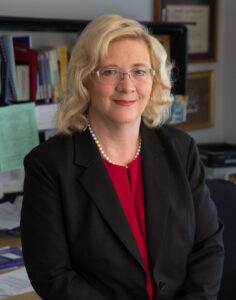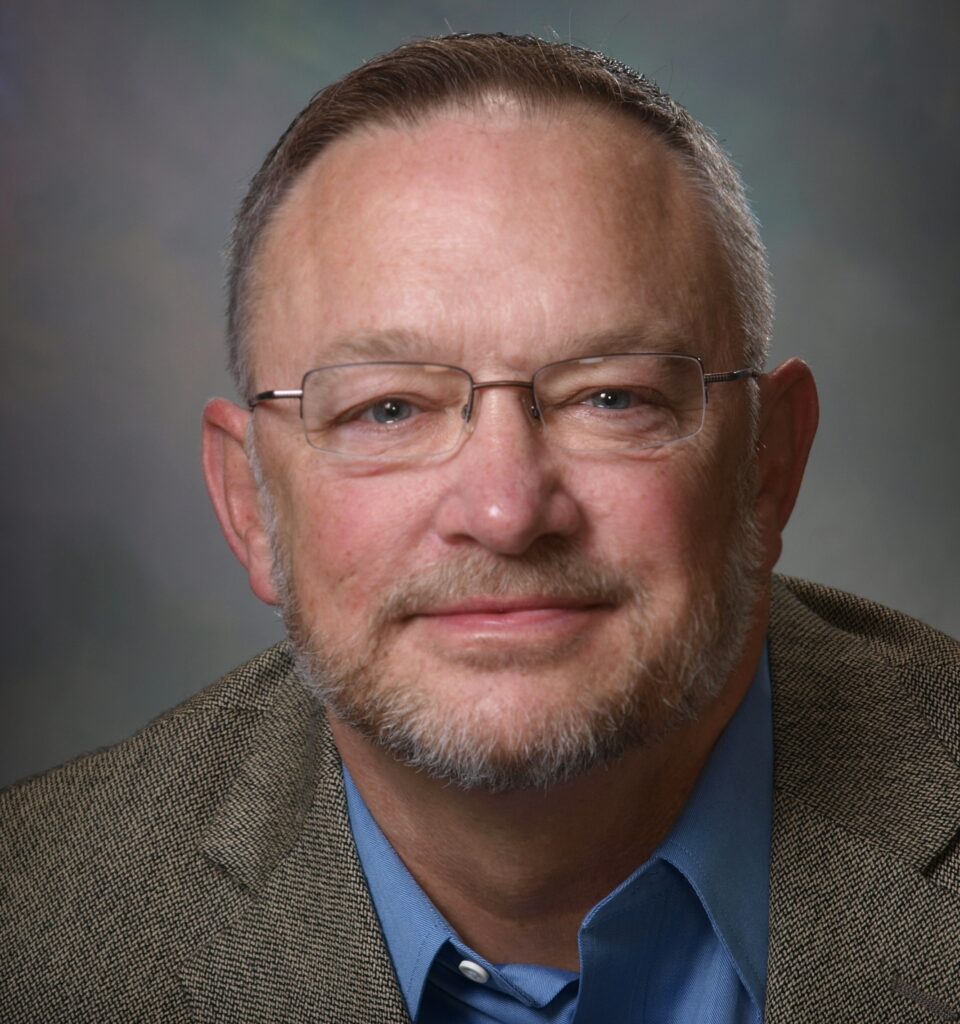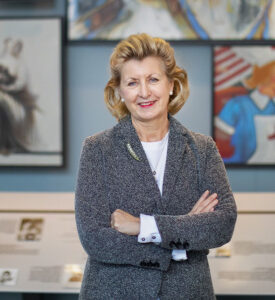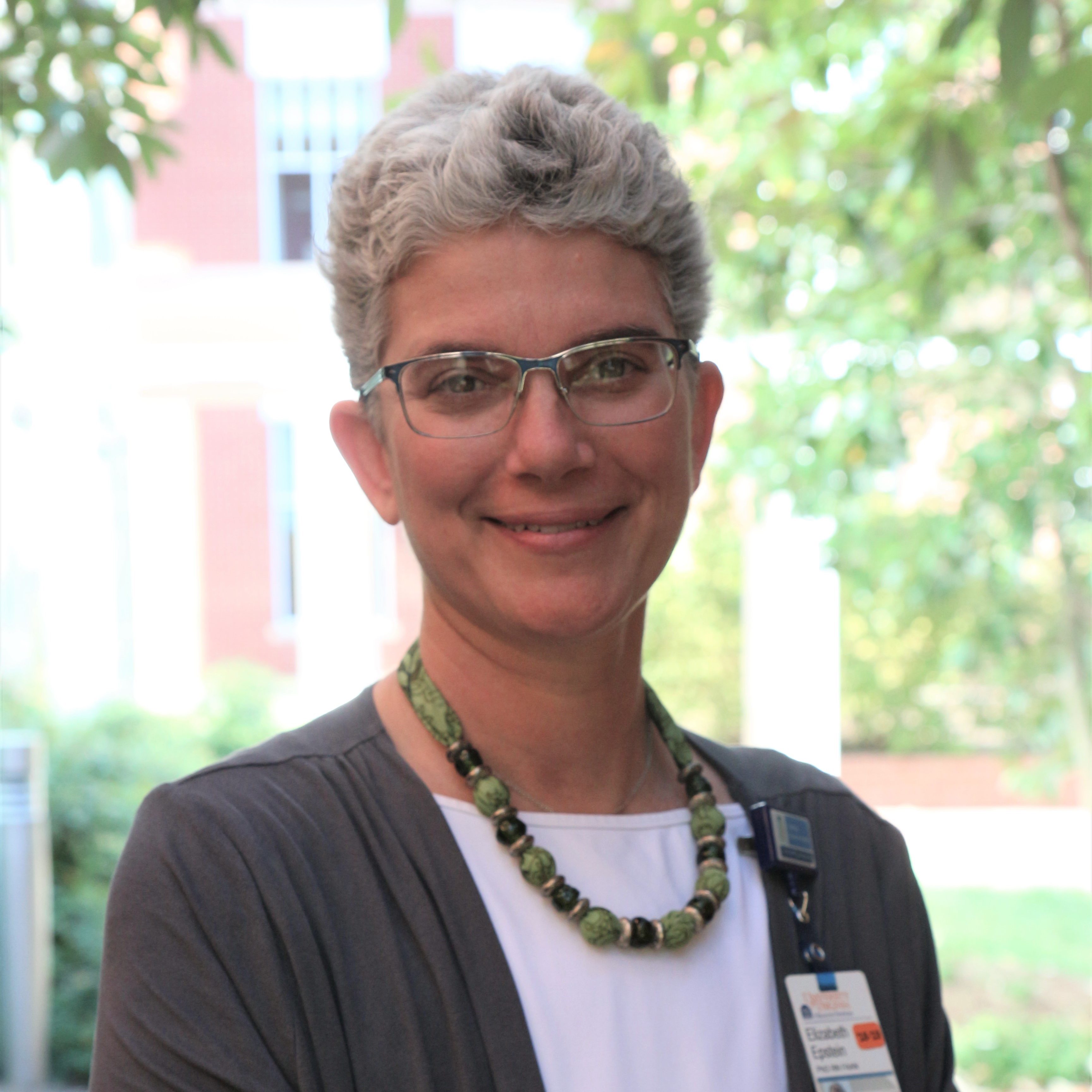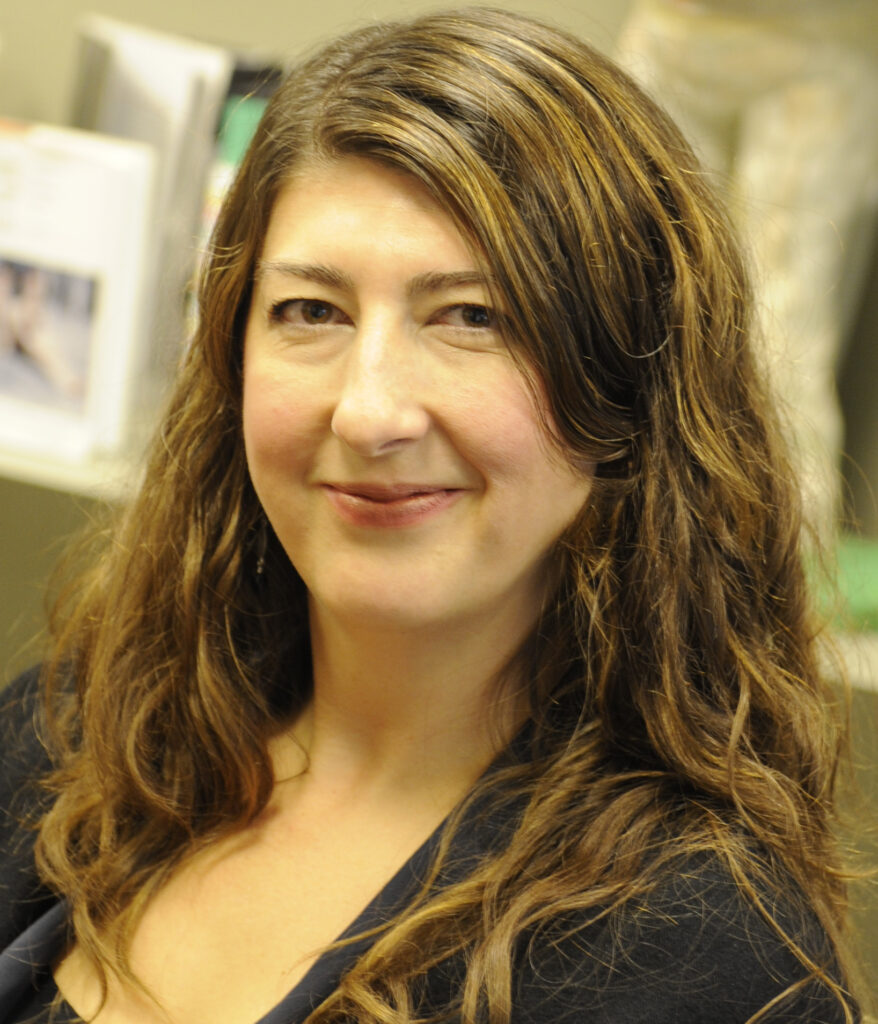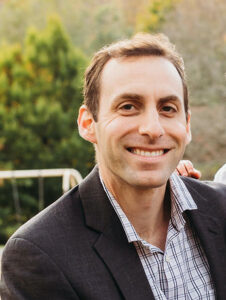Keynote Day 1: BETTY R. FERRELL, PhD, MA, CHPN, FAAN, FPCN
Director and Professor, Nursing Research & Education
City of Hope National Medical Center
“The Enduring Legacy of Nursing’s Compassionate Presence in Serious Illness”.
“To me, to talk about suffering is joyful. Yes, the world is full of suffering. People have said that, but the world is also full of nurses relieving suffering. We had this pandemic, and yet nurses were there, theyshowed up… What do I do as a nurse? I show up for every nurse who had the courage to get out of bedand come back to work the next day. Wow, what a victory, what a thing to celebrate.”
Expand to read an interview with Dr. Betty Ferrell
The theme for this conference is “It’s Complicated: Responding Ethically from the Beginning to the End of Life.” What does it mean to respond ethically? How does this theme resonate with your current research or practice?
This is a very different time, and I’ve been a nurse for 45 years. I can think of so many times where we’ve said, “Oh, this is really different,” just when we think it couldn’t get more stressful. I’ve lived through a lot of things, like 911, but living through the pandemic is very different. We are at a very different place in terms of nursing and the ethical nature of our work. One of the things that strikes me is that in so many things that we’ve dealt with – the first cases of AIDS and seeing the tragedy of that epidemic unfold – a key difference with the pandemic for me is that suddenly, we the health care workers were as vulnerable as anyone. And so having this personal threat and seeing our coworkers become ill and feeling that we were at such risk and then exposing our families to risk, that just exposed the layers of dynamics that we had not seen before. So thinking about end-of-life care and the ongoing work of serious illness care…absolutely, it’s a complicated time.
We as people, as human beings first, are changed, because of the last few years. But as professionals, we are also changed; we’ve experienced vulnerability. We’ve gone from a nurse one day to a patient, a child, a parent the next. It opened us up in really different ways. My work is in the area of palliative care. Serious illness care and end-of-life care are very much a part of what we’ve just been through. It’s the concept of suffering. In 2008, I, along with my colleague Nessa Coyle, published our first book on the nature of suffering. We published that in 2008, because there has been a lot written over the years about suffering from the medical perspective, like the seminal work of Eric Cassell on The Nature of Suffering and the Goals of Medicine. But I wanted to say, wait a minute. Nurses are also at the frontlines of responding to suffering. And so we did work and then published our book, The Nature of Suffering and the Goals of Nursing. A year or so ago, a colleague, Billy Rosa – a newer nurse to the field, a brilliant scholar, and an ethicist at Memorial Sloan Kettering – really encouraged me to work on a new edition of that book. He said it’s time. He recently completed a masters in ethics and PhD at Penn. So we decided to do the book together.
In the first edition, I wrote most of it. But this time, we thought it’s really time to bring in a lot of voices. We really wanted to make sure that we were talking about suffering across the lifespan. So we invited several authors to join us, from perinatal, neonatal care all the way through geriatrics. The way the book is organized now is that each chapter addresses a different aspect of life, from perinatal all the way through geriatric care. Then Billy and I took all of that work, synthesized it, and thought, how would we revise the basic tenets with how we ended the first book? What I’m sharing at the conference is largely derived from the book, which will be released in August. It’s just a great time to write a book about suffering in the middle of a pandemic. All you have to do is look out the window, turn on the news and it’s right there. To have the book come out now, at this time…we’re clearly still dealing with issues of the pandemic. But I think we are also moving to a new place. Now is the time for reflection. Now is the time to ask, what have we learned? What do we need to do to learn from this before we move forward? That’s what I’m doing in my presentation. I’ve gone back through the whole book and extracted important themes across the chapters to share. I reflect on, what is the nature of suffering? What are the goals?
The last few years we have witnessed a disintegration in civil discourse especially with polarizing topics. Nurses can be caught in these dialogues, both with patients and their families, in their communities, as well as when they are sorting through their own values and determining how they honor them while addressing them as a professional. What are your thoughts on this, and can you give one piece of advice to address these challenges in these turbulent times? What is your perception of the current nursing ethical landscape?
I’m an eternal optimist with a disclaimer or label on my forehead. I always have hope for the future. I always think that whatever we’ve been through, ultimately, will strengthen us. So many horrible things happened in the pandemic, and it was undoubtedly so morally distressing on so many levels. But we also learned a lot, and it exposed a lot. My colleague, Billy [Rosa] is extremely involved in issues of equity and disparities and has written a lot of beautiful work about how, in the midst of the pandemic, we became so painfully aware of the inequity in the healthcare system. Those of us who still have a warm home and food on the table and the ability to educate our children, we have such a different experience than people who do not have all those advantages. As painful as that it, the fact that we’ve brought attention to and exposed inequities, to me is a positive thing. While we were going through the pandemic, it wasn’t the only thing happening in society, right? There was the pandemic and at the same time George Floyd and racial bias and issues related to women’s health and immigration. Society moves, goes on, in the midst of a pandemic.
Now we’re at this interesting place, today in 2023, where we look around and say, wow, there’s all this interest in diversity, equity and inclusion. Billy and I talked about how there’s great nursing literature now about how central nursing is to the issues of equity, right? Nurses are the predominant profession; the bedside nurses are the advocates for respectful care. Yes, I’m thrilled and I am waving that flag. Absolutely, we need to be attending to diversity and equity and inclusion. But what I’ll also say is, that’s always been our choice as nurses. In May, I will celebrate my 45th year as a nurse, and I can promise you that the day I signed on to this profession in 1977, I signed on to respectful care. I signed on to advocacy. I signed on to speak about injustice. So is this a new call? A reminder: nurses always have been committed to issues of just and respectful care. Now, because we have all been through this really difficult time, we are reminded once again why the nurse’s voice must be a part of this conversation. This is in our DNA, right? You can turn in your license if you’re not ready to stand up every day of your practice and speak about injustice.
Do you have advice, given the turnover, for the population of newer nurses on how to navigate what it means to be a nurse?
Honestly, we need to love and hold and embrace and support our new nurses. Because I still remember vividly what it’s like to be a nurse. Seriously, if you just show up and take care of your patients, that’s great, like a big celebration at the end of every day. It is so hard to be a new nurse. You’re still figuring out how to do the technical skills, you’re growing as a person; it’s enormous. For the new graduates in our field, I would say, take good care of patients and take good care of yourself, and the rest will come. Once you feel competent in managing central lines, giving complex medications, doing procedures and getting really critically ill patients out of the hospital and sent home…you’ve sort of mastered the technical aspects. Then it is incumbent on you to begin to go deeper. Now that I’ve been endorsed, and I’ve cared for 400 underserved women on the maternity ward or now that I’ve been a new graduate and I’ve been working in the inner city hospital serving complex, chronic illnesses or now that I’ve been in a clinic and I’ve given chemotherapy to 700 people… Now that I’ve done the physical tasks of nursing, what have I learned? Because if you’re a new graduate, if you’ve been a nurse for a year, you have such wisdom. So much, because you sat there and started those IVs, sat there and helped make space, changed the patient, looked at the pressure ulcer, did mouth care.
There’s a lot of great ethics literature in nursing about being a witness, bearing witness. And in our work on suffering, a number of wonderful nurse authors who have talked about responding to suffering say that it means bearing witness. It means we are there. We are there the moment that woman wakes up having just lost her breast from a mastectomy. We are there on that surgery ward when the patient rolls back from having just had his leg amputated. We are front row to suffering, right? It’s your job as a nurse to witness suffering. That’s your job. That’s what you do, even as a 22-year-old new graduate from that year of bedside care. Now you need to speak up and use your voice. Talk to the media, talk to your legislator, talk to administrators and say, we are now being asked to send women home six hours after a mastectomy. Let me tell you what these women are saying to me. Like the god mothers and fathers of nursing say, nursing is about speaking for the people who can’t speak for themselves, whether they can’t speak because they don’t speak English, whether they can’t speak because they just got in the country last week, whether they can’t speak because they are too sick or too young or too old. We are the voice of the vulnerable. That’s, again, in the DNA. It’s in the job description. You signed on to do the work, right?
Can you tell us where you are finding joy in life, despite the challenges around us?
To me, to talk about suffering is joyful. Yes, the world is full of suffering. People have said that, but the world is also full of nurses relieving suffering. We had this pandemic, and yet nurses were there, they showed up. We talk about that a lot, too. What do I do as a nurse? I show up for every nurse who had the courage to get out of bed and come back to work the next day. Wow, what a victory, what a thing to celebrate. So I’m joyful. I’ve always said, with 100% sincerity, that I wake up every day of my life thrilled to be a nurse. Kind of jokingly, but not really, I feel sorry for all the people around who aren’t nurses. I’m really sorry they don’t have the experience, lots of meaningful work in the world. We are so fortunate to do this work. So I’m optimistic. I’m optimistic that from this really difficult time, progress will happen.
I think our nurses are exhausted and overwhelmed. They need so much support. I’m the first to agree to that. But I also think, from this, we will grow and we will do better. Yes, it’s really messy right now to deal with all of these issues of inequity and injustice. It’s messy to look at all the huge gaps and problems of our healthcare system. But you know what would be worse is to not talk about it. What would be worse is to ignore the messiness we live in. So lay it out there. I’m thrilled, because when I started nursing, we didn’t talk about all these things. I started nursing where we didn’t say, maybe our African American patients aren’t getting such good care. So we’re talking about it. And I think we’re at this place, because we now have the courage to talk about where the huge problems are. I also think we have the ability to improve.
For new nurses or people starting their career this year in the messiness, I would say, you still made the right decision. You still chose the right career. You have a lifetime of joy and privilege to look forward to. You are so lucky.
WILLIAM P. NASH, MD
Consultant Social Psychiatrist to the United Nations
“Healthcare, Moral Injury, and the Awesome Power of Goodness”
“At the heart of current polarizations in our societies is a collapse of trust – or more accurately, a widening and deepening of the chasms of distrust already prevalent in traumatized or oppressed communities. Healthcare, like all human-service institutions, cannot function without trust.”
Expand to read an interview with Dr. William P. Nash
The theme for this conference is “It’s Complicated: Responding Ethically from the Beginning to the End of Life.” What does it mean to respond ethically? How does this theme resonate with your current research or practice?
At their best, healthcare systems provide compassionate, humanizing environments in which some of life’s most difficult transitions can be navigated with dignity, hope, and peace. At their worst, they are profit centers for corporations that control costs by limiting access to care in every way possible. As the character of healthcare as a for-profit business has become increasingly prominent in the U.S., frontline healthcare workers like nurses have increasingly found it simply impossible to be a compassionate, humanizing influence with every patient, however hard they try. Too often, ethical practice in such a system means finding the least of all evils in each clinical situation – for both patient and healthcare worker – while advocating for increasing resources available for care. But the least evil option in any situation is still not good, and can be a source of moral distress.
The last few years we have witnessed a disintegration in civil discourse especially with polarizing topics. Nurses can be caught in these dialogues, both with patients and their families, in their communities, as well as when they are sorting through their own values and determining how they honor them while addressing them as a professional. What are your thoughts on this, and can you give one piece of advice to address these challenges in these turbulent times? What is your perception of the current nursing ethical landscape?
At the heart of current polarizations in our societies is a collapse of trust – or more accurately, a widening and deepening of the chasms of distrust already prevalent in traumatized or oppressed communities. Healthcare, like all human-service institutions, cannot function without trust. Now, more than ever, we need to attend to and assess the levels of trust our patients and communities hold for us, minute to minute, and to protect and strengthen that trust continuously. At an institutional or regional level, inviting members of the community to participate in planning and decision-making on a regular basis can also promote trust, if done with integrity.
Can you tell us where you are finding joy in life, despite the challenges around us?
I have learned to squeeze all the joy I can out of every small victory on behalf of my patients and my professional community, even successfully establishing a trusting relationship with another human being in need. I have also just bought a beautiful little house in rural western Connecticut where I am blessed daily by experiencing the beauty of New England forests, hills, and wildlife, including a resident flock of wild turkeys that favors my backyard for some reason.
Closing Speaker Day 1: CONNIE M. ULRICH, PhD, MSN, RN, FAAN
Lillian S. Brunner Chair, Professor of Nursing and Professor of Medical Ethics and Health Policy, University of Pennsylvania School of Nursing, Secondary Appointment, Department of Medical Ethics and Health Policy, Hastings Center and Salzburg Global Fellow
“Stand Up, Stand Out: The Value of Nurses and Nursing.”
“Responding ethically might mean having the ability to sit with your patients and be able to listen to their concerns related to their goals of care, to show respect for their humanity and vulnerability when they are often faced with difficult choices.”
Expand to read an interview with Dr. Connie Ulrich
The theme for this conference is “It’s Complicated: Responding Ethically from the Beginning to the End of Life.” What does it mean to respond ethically? How does this theme resonate with your current research or practice?
Responding ethically might have a different meaning depending on the individual or individuals involved in a particular ethical issue. Generally, my colleagues and I have written that ethical issues can arise in any situation when one has profound moral questions about the rightness or wrongness of that situation, and it underlies professional decision-making and the beneficent care of patients (families or communities).
To me, responding ethically could simply mean raising a concern about an ethical issue that is troubling you or reaching out to your colleagues to discuss the situation. It could also mean seeking an ethics consultation to gather an outside view and help you better understand what ethical principles might be at stake and how to work through a resolution that is acceptable to all parties. Responding ethically might also mean having the ability to sit with your patients and be able to listen to their concerns related to their goals of care, to show respect for their humanity and vulnerability when they are often faced with difficult choices.
This theme absolutely resonates with my current work as some of my research with clinical ethicists during the height of the COVID-19 pandemic where nurses, physicians and others were overwhelmed with volumes of sick patients and with limited resources. They were often questioning what does it mean to respond ethically when one doesn’t have the resources to do so and to meet all the needs of patients who come before you. Of course, this lead to moral distress and other emotional and physical consequences.
The last few years we have witnessed a disintegration in civil discourse especially with polarizing topics. Nurses can be caught in these dialogues, both with patients and their families, in their communities, as well as when they are sorting through their own values and determining how they honor them while addressing them as a professional. What are your thoughts on this, and can you give one piece of advice to address these challenges in these turbulent times? What is your perception of the current nursing ethical landscape?
We have indeed witnessed distressing events and I am reminded of this by those nurses who are practicing on the frontlines and have experienced emotional and physical abuse from their patients and families (and colleagues as well). I am very worried about the civil discourse in our society, its coarsening, and the aggression that we are now seeing within the clinical arena. Unfortunately, the larger polarized macro issues of our society funnel down to the micro level and it creates much conflict for nurses as they balance their personal values and ethics and their professional obligations to patients and families. This is no easy task. I would encourage nurses to seek an ethics consultation whenever they feel uneasy about a particular situation where they can talk through why they are feeling the way they are and how to address the conflict between their personal ethics/values/belief system and what their professional ethics might require. Of course, if someone is being threatened or in danger of harm in any way, immediate action is needed. I would encourage every nurse to know whether their institution has policies/procedures for incivility and harm. If not, this is a discussion that I would ask every nurse to begin to have within their institutions and to take the lead and insist that sound policies are needed to protect healthcare workers as they work to care for patients and families.
What is your perception of the current nursing ethical landscape? Are there ethical dilemmas or questions that are trending in your line of work right now?
I would not be honest if I did not say that I was worried. Nurses have been through so much in the past few years and in some cases continue to face unprecedented ethical challenges. But I also realize that we must work together to continue to address the most urgent ethical issues that nurses are facing. We also need more nurses to take the lead in bioethics so their voices are heard, and changes can be made within the healthcare system. I am currently in the process of working on a grant where I am trying to better understand the ethical challenges that nurses are facing and how this links to nurse and patient outcomes. We continually need to show the data so we can emphasize the seriousness of nurses’ concerns to management, policy makers, and others. We already know the seriousness of the problems but sometimes it takes time (and data) to show others so changes can be made.
Can you tell us where you are finding joy in life, despite the challenges around us?
First, my husband continues to make me laugh and is the best quipster that I know! I also am fortunate to teach bioethics to nursing students who always keep me on my toes and help me gain greater insights on balancing the challenges before us or provide me with a nuanced way to think about an issue. And I bake. I love to bake, although that is not always the healthiest when you are baking chocolate chip cookies or a chocolate cake every week, but it sure does help! Finally, I am a WORDLE player. Trying to get those five letters in six tries gives me joy as I compete with my sisters!
BETH EPSTEIN, PhD, RN, HEC-C, FAAN
Professor
Associate Dean for Academic Programs
“Physics 101: The atomic weight of matter(ing) in contemporary healthcare”
“Creating an environment where people can feel safe when they’re talking with you, and you
can ask questions and be asked questions, and you can respond in a way that is genuine and
curious. I will say that that’s easier said than done for some things, but ‘I’m curious about’ or
‘Can you help me understand?’ are the golden phrases for me. You might actually learn
something that you didn’t know.”
Expand to read an interview with Dr. Beth Epstien
The theme for this conference is “It’s Complicated: Responding Ethically from the Beginning to the End of Life.” What does it mean to respond ethically? How does this theme resonate with your current research or practice?
Right now, for me, it means making sure that the people who don’t have a voice, who tend to be under-heard, have opportunities to bring their voices forward. I’ve found myself taking a kind of feminist ethics perspective, and not just the female voice, but really underrepresented voices and primarily those of clinicians. So I’m listening intently to people who’ve had their boots on the ground throughout COVID and who are very committed to their workplaces and feel very undervalued.
It’s responding to staffing. It’s complicated because the [nurse] traveler is still an issue. And I have great respect for travelers. I know why they’re needed and I know why hospitals have hired so many, but it’s not all about money. I do wonder if there might be a different way to address it, so that people who have been very dedicated, who are committed members of a team over the long haul, are recognized for what they’ve done in some meaningful way. I don’t know what that looks like for those folks, if it’s mostly money or if it’s some other kind of recognition.
The other piece I’m reading and seeing and hearing from my colleagues is that health care organizations are increasingly commercialized and the bottom line is the dollar and not the patient. It’s very worrisome from an ethics stance. It’s worrisome for clinicians who you know went into nursing, medicine, respiratory therapy, etc. to take care of patients and when they have to be thinking about how much money you get, getting the patient discharged, readmissions, RVUs, supplies, staffing crunches and all that kind of thing. I feel like decisions aren’t always made with the interest of the patient in mind. And I think that’s worrisome. So it’s responding to those issues.
And I worry about clinicians who just are not feeling like their values really fit anymore in healthcare… It is a weariness. In talking to other colleagues and other institutions, they’re also having difficulty. I’m on the education side of things right now, and finding preceptors for our nurse practitioner students is a challenge. It’s a challenge because there’s so much pressure for RVUs that NPD APPs can’t be released from that chokehold in order to precept and mentor students who will replace them. So you hear all these places that say they have five or so many NPD openings but they’re not able to precept NPs who could fill those spots. It feels deep and it’s a weariness. You have to have a succession plan. You’re shooting yourself in the foot if you’re not allowing people to train the next generation.
The last few years we have witnessed a disintegration in civil discourse especially with polarizing topics. Nurses can be caught in these dialogues, both with patients and their families, in their communities, as well as when they are sorting through their own values and determining how they honor them while addressing them as a professional. What are your thoughts on this, and can you give one piece of advice to address these challenges in these turbulent times? What is your perception of the current nursing ethical landscape?
My perspective comes from the educator piece, working with our students to make sure they know how to phrase and start those kinds of conversations without creating a wedge between themselves and the people that they’re asking questions. So the one piece of advice that seems to work pretty well for me and for lots of my colleagues is to begin the conversation with, “Can you help me understand?” It seems so minor. “What I’m seeing is this, and I’m having a hard time seeing anything different. Can you help me figure out how I should be, how I could be looking at this differently, or how you’re looking at this? I’m curious to know.” I think that helps open the door rather than what you might be saying in your head: “Why in the world are we doing this? This is ridiculous.” But as soon as you say that out loud, you lose your ability to be neutral. You also create a wall between yourself and the other person, and their defenses go right up. It doesn’t take a lot for other people’s defenses to go up. I think we’re just hyper alert to needing to raise our defenses and protect ourselves. So creating an environment where people can feel safe when they’re talking with you, and you can ask questions and be asked questions, and you can respond in a way that is genuine and curious. I will say that that’s easier said than done for some things, but “I’m curious about” or “Can you help me understand?” are the golden phrases for me. You might actually learn something that you didn’t know.
The other piece is something I learned early in my nursing career. When I’m asking a question of someone who’s a couple of rungs up on the power scale or power ladder, I come with an educated perspective. So I have gone to the library and I’ve read a couple articles. I’ve looked for some data, so what I’m talking with a person about is not from an emotional perspective or emotional point of view. It’s from the cognitive point of view, when you’re talking about facts and evidence. That tends to be better accepted and received.
What is your perception of the current nursing ethical landscape? Are there ethical dilemmas or questions that are trending in your line of work right now?
I wonder if there are ethical questions about what the nursing role is in complex patient management. This is where my interest in mattering comes from. There’s a huge untapped reservoir of expertise and professionalism and holistic approaches to patient care that is just in nursing and is just completely untapped. You need to know how to tap into that or how to raise awareness that nursing can do much more than is currently expected by the public or by organizational leaders. There’s so much more potential. For me, I think the ethical aspects of nursing is where does nursing contribute and where does nursing belong in the whole healthcare arena? It could be so much more impactful. Nursing is impactful, don’t take me wrong, but I think it’s an untapped resource… [Nursing was growing and] it feels like it came to a screeching halt. Now we’re back to warm bodies.
Can you tell us where you are finding joy in life, despite the challenges around us?
Oh gosh, I find lots of joy in my life. One is, I love my colleagues. I have just the deepest respect and love for my colleagues and love to do things that are fun together. A bunch of have gone out to dinner. We do Wine and Design. You know, fun things together outside of work, which I think is important to have that kind of support. So when you go to work, you feel like people will miss you if you don’t show up. The other thing is we have a pandemic puppy and as an empty nester we have someone to snuggle with and love. She’s just a doll. And I’ve had time during the pandemic to get back into playing the cello, which I’ve played since I was eight. I’m a busy faculty member and a busy mom. I kind of had to set it aside for a while, but I’ve been able to get back into it and I’m playing in an orchestra. I look forward to Wednesday nights and that’s a lot of fun. I’m in a bunch of quartets and I play with a pianist in the hospital lobby. It’s that kind of thing that gives me joy. And my family.
Keynote Day 2: KATIE WATSON, JD
Associate Professor of Medical Education, Medical Social Sciences, and Ob/Gyn
Faculty, Medical Humanities & Bioethics Graduate Program
Northwestern University Feinberg School of Medicine
“Honoring Both Patient and Clinician Conscience: The Ethics of Access in
Tumultuous Times for Abortion Care”
MICHAEL SHEA, PhD
Assistant Professor of Philosophy,
Franciscan University of Steubenville
